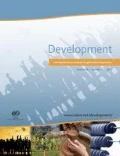Abstract
In September 2015 the United Nations General Assembly formally accepted the 2030 Agenda for Sustainable Development. More commonly known as the ‘Sustainable Development Goals’, the 2030 Agenda will reflect the values and direct the actions and the resources of the global development industry for the next decade and a half. We interviewed key informants—civil society representatives, government officials, and development practitioners—who were either part of or closely observed the process leading up to the publication of the SDGs. We asked them what their early assessment of Agenda 2030 was, and whether in their view, it would indeed, eliminate poverty, inequalities, and inequities by 2030. We have integrated these assessments with those published in the academic literature that has emerged since September 2015, to map the emerging narratives—critical and supportive. We have found some optimism about the broad outlines of the development project, but also significant scepticism about its detail. For the SDGs to be deemed a success, real development should aim to subvert reactionary elements, whilst at the same time working creatively, to forge new alliances in seeking out new agency.
Notes
‘…Agenda 2030 combines progressive gender equality targets with targets on women’s economic empowerment which limit themselves to addressing liberal concerns in the existing profoundly unequal global economy. As such, Agenda 2030 has an ambivalent nature from a feminist standpoint’ (Esquivel 2016: 19).
References
Bacchi, Carol. 2009. Analysing policy: What’s the problem represented to be? Frenchs Forest: Pearson Education.
Bidegain Ponte, Nicole, and Corina Rodríguez Enríquez. 2016. Agenda 2030: A bold enough framework towards sustainable, gender-just development? Gender & Development 24 (1): 83–98.
Briant Carant, Jane. 2016. Unheard voices: A critical discourse analysis of the millennium development goals, evolution into the sustainable development goals. Third World Quarterly. http://www.tandfonline.com/doi/full/10.1080/01436597.2016.1166944. Accessed August 14, 2016.
Civil Society Response to the Addis Ababa Action Agenda on Financing for Development. 2015. Addis Ababa, 16 July.
Cornwall, Andrea, and Althea-Maria Rivas. 2015. From “gender equality and women’s empowerment” to global justice: Reclaiming a transformative agenda for gender and development. Third World Quarterly 36 (2): 396–415.
Denney, J. Michael. 2015. Gender and the sustainable development goals: moving beyond women as a “Quick Fix” for development. In Governance and sustainable issue brief series: Brief 11. Center for Governance and Sustainability. University of Massachusetts Boston.
Edelman, Murray. 1988. Constructing the political spectacle. Chicago: University of Chicago Press.
Esquivel, Valeria. 2016. Power and the sustainable development goals: A feminist analysis. Gender & Development 24 (1): 9–23.
Esquivel, Valeria, and Caroline Sweetman. 2016. Gender and the sustainable development goals. Gender & Development 24 (1): 1–8.
Ferguson, James. 1994. The Anti-politics machine: ‘Development’, depoliticization and bureaucratic power in Lesotho. Minneapolis: University of Minnesota Press.
Fischer, Frank. 2003. Reframing public policy: Discursive politics and deliberative practices. Oxford: Oxford University Press.
Fukuda-Parr, Sakiko. 2016. From the millennium development goals to the sustainable development goals: Shifts in purpose, concept, and politics of global goal setting for development. Gender & Development 24 (1): 43–52.
Gabizon, Sascha. 2016. Women’s movements’ engagement in the SDGs: Lessons learned from the women’s major group. Gender & Development 24 (1): 99–110.
Halford, Stuart, and Sandeep Prasad. 2014. The shifting politics in multilateral development and human rights negotiations and the absence of accountability. Reproductive Health Matters 22 (44): 109–113.
Ingram, Helen, and Anne Schneider. 2005. Deserving and entitled: Social construction and public policy. New York: University of New York Press.
Koehler, Gabrielle. 2016. Tapping the sustainable development goals for progressive gender equity and equality policy? Gender & Development 24 (1): 53–68.
O’Manique, Colleen, and Pieter Fourie. 2016a. Gender justice and the MDGs: South Africa and Canada considered. Politikon 43 (1): 97–116.
O’Manique, Colleen and Pieter Fourie. 2016b. ‘Affirming our world: gender justice, social reproduction, and the sustainable development goals’. Development. doi:10.1057/s41301-017-0066-0.
Razavi, Shahra. 2016. The 2030 Agenda: Challenges of implementation to attain gender equality and women’s rights. Gender & Development 24 (1): 25–41.
Rochefort, David, and Roger Cobb (eds.). 1995. The politics of problem definition: Shaping the policy agenda. Lawrence: University of Kansas Press.
Rosche, Daniela. 2016. Agenda 2030 and the sustainable development goals: Gender equality at last? An Oxfam perspective. Gender & Development 24 (1): 111–126.
Schön, Donald, and Martin Rein. 1994. Frame reflection: Toward the resolution of intractable policy controversies. New York: Basic Books.
Starrs, Ann. 2015. A lancet commission on sexual and reproductive health and rights: Going beyond the sustainable development goals. The Lancet. doi:10.1016/S0140-6736(15)00250-0.
Stone, Deborah. 2002. Policy paradox: The art of political decision-making. New York: W. W. Norton and Company.
Stuart, Elizabeth, and Jessica Woodroffe. 2016. Leaving no-one behind: can the sustainable development goals succeed where the millennium development goals lacked? Gender & Development 24 (1): 69–81.
Ziai, Aram. 2016. Development discourse and global history: From colonialism to the sustainable development goals. London and New York: Routledge.
Funding
This research was supported by the Social Sciences and Humanities Research Council (SSHRC), Canada [Grant Number 55-51431].
Author information
Authors and Affiliations
Corresponding author
Rights and permissions
About this article
Cite this article
Fourie, P., O’Manique, C. ‘It Sells, But It Does Not Fly’: An Early Assessment of the 2030 Agenda for Sustainable Development. Development 59, 274–279 (2016). https://doi.org/10.1057/s41301-017-0100-2
Published:
Issue Date:
DOI: https://doi.org/10.1057/s41301-017-0100-2

